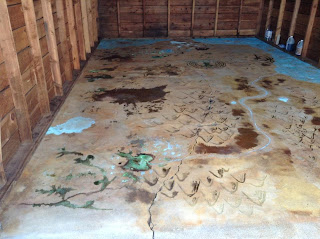It’s a
question I get asked over and over (as many writers do, I’m sure), and I was
asked again recently. “How do you get your
ideas?” There’s actually no easy answer, but I always remember something I was
told years ago – “Ideas don’t usually come knocking on your door. You have to
go out there and hunt them down.”
There are
quite a few myths about ideas. One is that there is a limited number and if you
get a good one, you have to hang onto it and make it work. I see lots of people
in my classes who cling doggedly to what they think is their one and only idea
and work it to death, and then wonder what happened.
Another is
that a really good idea can’t possibly come from a writing exercise. Some
writers regard that as a kind of cheating, as if the idea somehow belongs to
the person who gave them the writing exercise. Some of my best poems and
stories have come from exercises. Then there’s the myth that a great idea will
come in a huge flash like a revelation, so all those other ideas you might have
are not as “worthy”.
It’s true
that writers do get amazing ideas in an inspired moment, but those moments are
few and far between, especially if that’s all you are doing – waiting for it to
happen. It’s far more likely that the brilliant idea will come because you have
been working on ideas all along, and coming up with lots, and then something
clicks (because the brain is a wonderful, mysterious thing) and bang! You have
a great idea!
I think the trick
to coming up with good ideas is a combination of things. The key element is
practice. I’ve just done Picture Book Idea Month for the first time and, I have
to admit, I quailed a little at the challenge. One picture book idea every day
for 30 days? But as with Nanowrimo, you have to put aside all notions of judgment
and go with it. I found that the more ideas I wrote down, the more I came up
with.
That’s
another myth – that you will run out of ideas if you do something like this. I
have found that the more you “hunt down” ideas, the more your brain will work
to help you come up with them. It’s as if you’re engaging your ideas gear, but
being non-judgmental is important. If you are prone to dismissing ideas with a “oh,
that’s just stupid” before you even get them onto the page, you will certainly
stifle yourself.
Some things
that have helped me over the years with ideas (and these are the tips I give
kids when I do school talks, as well as adults in my classes) include:
- · Carrying a notebook with me to record every single snippet of an idea I see, hear, notice, think of.
- · Collecting material that spark something in my brain that might bear fruit later – including pictures, cartoons, news items, articles, stories, quotes.
- · Reading lots of different books and materials and being open to ideas that leap out from things I’m reading (it happens especially with poetry).
- · Setting myself a challenge (like PiBoIdMo) to come up with a whole bunch of ideas over a period of time.
- · Doing writing workshops and exercises, either in a class or group, or from a book (there are some great books of writing prompts).
- · Understanding that one idea is usually not enough, but if I keep it and ponder on it some more, sooner or later another idea comes along and creates enough sparks to lead to something exciting.
What works
for you?








